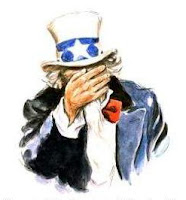"The woods decay, the woods decay and fall,
The vapours weep their burthen to the ground,
Man comes and tills the field and lies beneath,
And after many a summer dies the swan.
Me only cruel immortality
Consumes; I wither slowly in thine arms,
Here at the quiet limit of the world,
A white-hair'd shadow roaming like a dream
The ever-silent spaces of the East,
Far-folded mists, and gleaming halls of morn.
Alas! for this gray shadow, once a man--
So glorious in his beauty and thy choice,
Who madest him thy chosen, that he seem'd
To his great heart none other than a God!"
Tithonus, Alfred Lord Tennyson
 The recognition of a US slide into stagflation is beginning to appear in the mainstream media, in this case The New York Times. A slackening in aggregate demand was offset by higher prices paid for necessities such as food and energy, which are running at the shocking annual rate of 13%. This is no surpise to use, as it is in-line with the growth of broader monetary aggregates such as MZM.
The recognition of a US slide into stagflation is beginning to appear in the mainstream media, in this case The New York Times. A slackening in aggregate demand was offset by higher prices paid for necessities such as food and energy, which are running at the shocking annual rate of 13%. This is no surpise to use, as it is in-line with the growth of broader monetary aggregates such as MZM.
It has been the custom of Americans since WWII increasingly to place their savings in their homes, or the housing portion of their balance sheet. The decline of total credit outstanding as debt defaults increase will be charged against the value of that housing asset, which is equivalent to the US consumers savings account. Money is the transmission mechanism between balance sheets and income statements. Therefore we see no fundamental reason for the aggregate money supply to contract, except for brief periods of liquidity constriction which will be more than offset by the Fed. generating monetary inflation as it attempts to restore the bank's balance sheets.
The US middle class will receive the worst of all worlds: higher prices for necessities while their savings evaporate, in large part to underpin the financial system and rescue the banks, ironically securing the advantage gained by the top 1% of US families over the past 27 years, from Reagan to Bush. The situation is a classic case of overreach by the ruling elite.
We expect this trend to intensify, wax and wane, and not abate until median US wage growth starts to outpace inflation. This will require a much cheaper dollar than we have today, perhaps on the order of thirty-five percent or more, to achieve a sustainable equilibrium.
These gains cannot be achieved solely against the euro, but must include the Asian countries running large trade imbalances with the US. Since this conflicts with their long established mercantilist industrial policy we can look for considerable turmoil in the world's government-managed markets. Trade wars will be interspersed by localized military conflicts in resource important areas at worst if we are fortunate.
Politically it will be a replay of the politics of the New Deal in which a Democratic majority attempts to reform and provide relief, while a Republican minority in Congress and a Republican backed Supreme Court use every method to thwart and overturn these reforms and programs.
Unless the Fed mismanages the situation badly, or there is a precipitous shift in world reserves away from the dollar, we believe that hyper-inflation is as unlikely as a true monetary deflation in the US. Stagflation of varying intensity for a period of fifteen years of adjustment seems more probable, unless it is interrupted by an exogenous global conflict or domestic revolutionary change. The desired outcome which will be proffered by the power elitest will be a regional to global oligarchically managed economy.
"FACED with tightening credit and a slowing economy, America’s consumers are being forced to scale back their purchases, but high prices of necessities are keeping their overall purchases rising at a reasonably strong rate.
The retail sales report for January showed overall retail sales that were stronger than many economists had expected, and was well received by the stock market on Wednesday, the day it was released. In total, retail sales are running more than 4 percent over the level of a year ago, an increase that is above the overall inflation rate and much stronger than the sales were when the last recession began in early 2001.
But the overall change is misleading. One reason for its strength is that prices of necessities are up sharply over the past year, meaning that those items consume more and more of the household budget, leaving less for other things.
Over all, Americans are spending about 13 percent more on food and energy now than a year ago. The figures, as are all the figures shown in the charts accompanying this article, are based on three-month moving averages of seasonally adjusted figures, and compare this year with last year."
New York Times, Floyd Norris, Feb 16, 2008






































